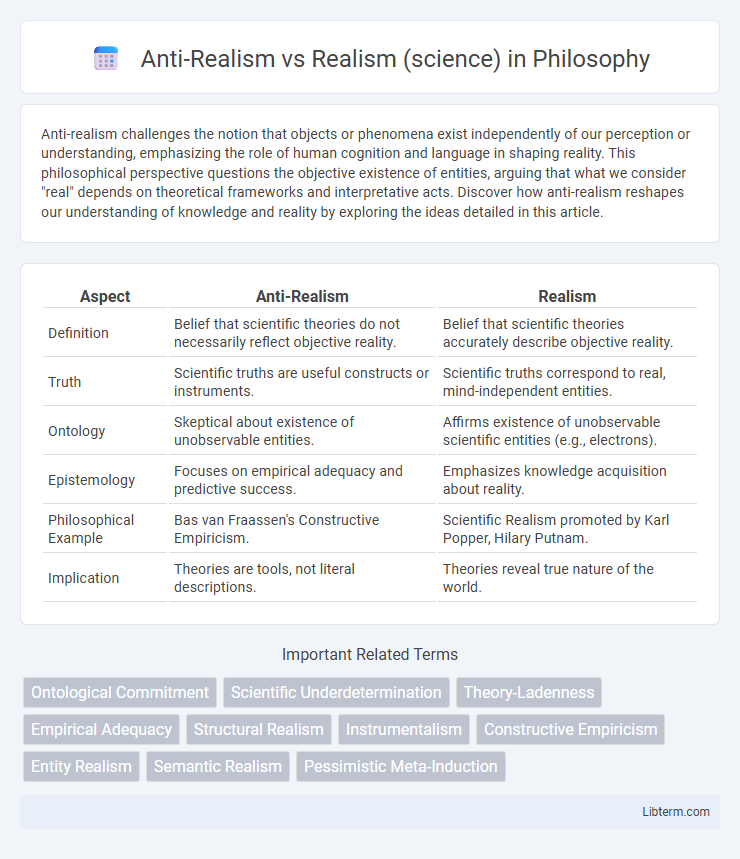Anti-realism challenges the notion that objects or phenomena exist independently of our perception or understanding, emphasizing the role of human cognition and language in shaping reality. This philosophical perspective questions the objective existence of entities, arguing that what we consider "real" depends on theoretical frameworks and interpretative acts. Discover how anti-realism reshapes our understanding of knowledge and reality by exploring the ideas detailed in this article.
Table of Comparison
| Aspect | Anti-Realism | Realism |
|---|---|---|
| Definition | Belief that scientific theories do not necessarily reflect objective reality. | Belief that scientific theories accurately describe objective reality. |
| Truth | Scientific truths are useful constructs or instruments. | Scientific truths correspond to real, mind-independent entities. |
| Ontology | Skeptical about existence of unobservable entities. | Affirms existence of unobservable scientific entities (e.g., electrons). |
| Epistemology | Focuses on empirical adequacy and predictive success. | Emphasizes knowledge acquisition about reality. |
| Philosophical Example | Bas van Fraassen's Constructive Empiricism. | Scientific Realism promoted by Karl Popper, Hilary Putnam. |
| Implication | Theories are tools, not literal descriptions. | Theories reveal true nature of the world. |
Introduction to Realism and Anti-Realism in Science
Realism in science asserts that scientific theories accurately describe an objective, mind-independent reality, with entities and processes existing whether observed or not. Anti-Realism challenges this view by arguing that scientific theories are merely instruments for predicting observable phenomena without necessarily revealing true underlying structures. This debate centers on the ontological status of unobservable entities and the epistemic limits of scientific knowledge.
Defining Scientific Realism: Key Concepts
Scientific realism asserts that the entities postulated by scientific theories, such as electrons or black holes, genuinely exist independently of human observation. It emphasizes that successful scientific theories provide approximately true descriptions of both observable and unobservable aspects of the world. Central concepts include theory truth, reference, and the idea that empirical success of science implies the truth or near-truth of scientific claims.
Understanding Anti-Realism in Science
Anti-realism in science asserts that scientific theories are not necessarily true representations of reality but useful instruments for predicting observable phenomena. This perspective emphasizes the pragmatic value of theories without committing to the existence of unobservable entities posited by scientific models. Prominent anti-realist positions include instrumentalism and constructive empiricism, which argue that success in scientific practice does not guarantee ontological truth.
Historical Development of the Debate
The historical development of the Anti-Realism vs Realism debate in science traces back to the early 20th century with the rise of logical positivism and scientific empiricism challenging metaphysical interpretations. Key figures such as Thomas Kuhn and Bas van Fraassen shaped the discourse by questioning the notion of scientific theories as literally true, emphasizing paradigm shifts and empirically adequate models instead. The debate evolved through post-World War II philosophy of science, balancing ontological commitment against epistemic humility in scientific practice and theory interpretation.
Core Arguments for Scientific Realism
Scientific realism asserts that the entities and structures described by scientific theories genuinely exist and that these theories reliably approximate truth about the natural world. Core arguments for scientific realism include the "no miracle" argument, which claims the empirical success of science would be miraculous if theories were not at least approximately true. Furthermore, the predictive accuracy and explanatory power of scientific theories support the view that science progressively uncovers objective reality.
Major Critiques: The Case for Anti-Realism
Anti-realism challenges scientific realism by arguing that scientific theories are merely useful instruments for predicting phenomena rather than true descriptions of an objective reality. Critics highlight the historical record of theory change and theory-ladenness of observation to emphasize the provisional and fallible nature of scientific knowledge. Prominent anti-realists, such as Bas van Fraassen, advocate for constructive empiricism, maintaining that belief should be limited to empirical adequacy without committing to the literal truth of unobservable entities.
Instrumentalism and Constructivism: Anti-Realist Perspectives
Instrumentalism views scientific theories as useful tools for predicting phenomena without asserting their literal truth, emphasizing practical success over ontological commitment. Constructivism asserts that scientific knowledge is actively constructed by social processes and cultural contexts, challenging the notion of objective reality independent of human interpretation. Both perspectives reject the realist notion that theories truly describe an external reality, focusing instead on the functional and social dimensions of scientific practice.
Realism vs Anti-Realism: Key Philosophical Issues
Realism in science asserts that scientific theories aim to describe an objective reality that exists independently of human observation. Anti-Realism challenges this by claiming that scientific theories are merely instruments for predicting observable phenomena without necessarily revealing true nature of unobservable entities. Key philosophical issues center on the nature of truth, the existence of unobservable entities, and the epistemic justification for belief in scientific theories.
Implications for Scientific Practice and Progress
Anti-Realism in science argues that scientific theories are merely useful instruments for predicting phenomena without necessarily revealing true underlying realities, which encourages a focus on empirical adequacy and practical applications over ontological commitments. Realism asserts that scientific theories aim to accurately describe the world as it objectively exists, driving the pursuit of truth and the belief in progressive knowledge accumulation through successive theory improvements. The debate shapes scientific practice by influencing research priorities, theory evaluation, and attitudes toward theoretical entities, impacting the perceived legitimacy of scientific progress and innovation.
Conclusion: Current Trends and Future Directions
Current trends in the debate between anti-realism and realism highlight a growing integration of empirical findings with philosophical analysis, emphasizing scientific practice over metaphysical speculation. Future directions prioritize interdisciplinary approaches, leveraging advances in cognitive science and technology to refine understandings of theory-ladenness and scientific truth. This evolving landscape suggests a move towards pragmatic realism that balances epistemic humility with the robustness of scientific models.
Anti-Realism Infographic

 libterm.com
libterm.com